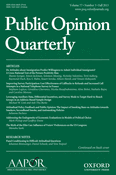-
Views
-
Cite
Cite
Matthew Luttig, The Structure of Inequality and Americans’ Attitudes toward Redistribution, Public Opinion Quarterly, Volume 77, Issue 3, Fall 2013, Pages 811–821, https://doi.org/10.1093/poq/nft025
Close - Share Icon Share
Abstract
Income inequality has been rising substantially over the past few decades in the United States, making it the most unequal of advanced industrialized democracies. This transformation has had enormous social and political consequences. In this research note, I assess the influence of both income inequality and the changing structure of income inequality on Americans’ public policy mood. Numerous political theorists suggest that rising inequality and the shift in the distribution of income to those at the top should lead to increasing support for liberal policies. But recent evidence contradicts these theories. I empirically evaluate a number of competing theoretical predictions about the relationship between inequality and public preferences. In general, the evidence supports the claim that rising inequality has been a force promoting conservatism in the American public.





